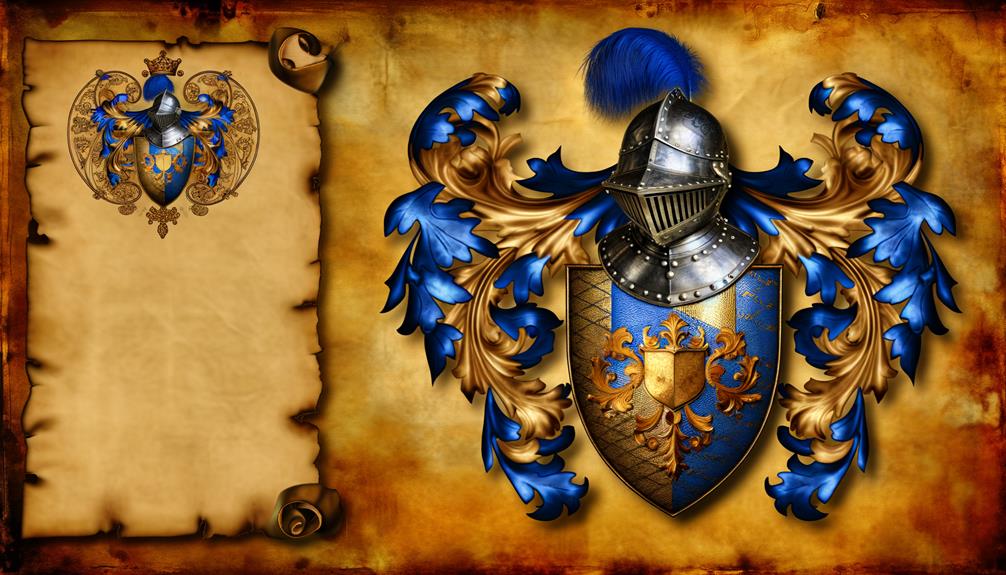Meaning of the Name Roger
The name Roger originates from the Old Germanic elements 'hrod' (fame) and 'ger' (spear), collectively meaning 'renowned warrior.' It evolved from Old High German to Old French, becoming prevalent in England post-Norman Conquest. Historically, it is associated with figures like Roger II of Sicily and Roger Bacon, signifying leadership and valor.
The name appears in various forms, such as 'Rogier' in Old French and 'Rüdiger' in German, illustrating its linguistic versatility. Modern bearers like Roger Federer continue its legacy of excellence.
While its popularity has varied, its symbolic meanings of resilience and leadership remain compelling. Discover its rich historical context and more.

Key Takeaways
- Derived from Old Germanic elements 'hrod' (fame) and 'ger' (spear), meaning renowned warrior.
- Introduced to England after the Norman Conquest, reflecting medieval European values of heroism and honor.
- Associated with notable historical figures like Roger II of Sicily and Roger Bacon.
- Variants include 'Rogier' in Old French and 'Rüdiger' in Germanic languages, showing its widespread cultural integration.
- Modern usage emphasizes resilience, leadership, and enduring strength, though its popularity has declined in recent years.
Origin and Etymology
The name Roger originates from the Old Germanic elements 'hrod,' meaning 'fame,' and 'ger,' meaning 'spear,' which collectively convey the notion of a renowned warrior. This etymological combination indicates a person esteemed for martial prowess and valor.
The name evolved through various linguistic stages, first appearing in Old High German as Hruodger and later adapting to Old French as Rogier. The Norman Conquest of 1066 facilitated its introduction into England, where it eventually morphed into the modern form, Roger.
This historical linguistic journey underlines the name's deep roots in medieval Europe, reflecting societal values of heroism and honor. Its widespread use across different cultures underscores its enduring appeal and adaptability over centuries.
Historical Significance
Throughout history, the name Roger has been borne by numerous notable figures, each contributing to its rich legacy and reinforcing its association with leadership and valor. Originating from the Germanic elements 'hrod,' meaning fame, and 'ger,' meaning spear, Roger has been a name synonymous with military prowess and governance.
| Name | Period | Contribution |
|---|---|---|
| Roger II of Sicily | 1095-1154 | Founded the Kingdom of Sicily |
| Roger Bacon | c. 1219-1292 | Pioneering contributions to scientific method |
| Roger de Flor | 1267-1305 | Led Catalan Company during Byzantine Empire |
| Roger Sherman | 1721-1793 | Signed U.S. Declaration of Independence |
| Roger Casement | 1864-1916 | Noted for humanitarian work and Irish nationalism |
This table highlights the diverse domains—politics, science, and humanitarian efforts—where the name Roger has left an indelible mark.
Linguistic Variations
As the name Roger has evolved through centuries of historical significance, its linguistic variations across different cultures and languages further underscore its widespread influence and adaptability.
In Old French, the name emerged as 'Rogier,' while in Germanic languages, it retained its essence as 'Rüdiger' or 'Rogger.' The Spanish adaptation, 'Ruy,' reflects local phonetic preferences, and in Scandinavian regions, it is often found as 'Roger.'
Each variation preserves the foundational elements of the name, rooted in the Germanic words 'hrod' (fame) and 'ger' (spear). This linguistic diversity illustrates the name's integration into various cultural lexicons, maintaining its core meaning while adapting to local linguistic frameworks.
Such variations highlight the name's enduring legacy across different epochs and societies.
Famous People Named Roger
The name Roger has been borne by several prominent figures across various fields, contributing to its enduring legacy. Among them are Roger Federer, the legendary tennis champion known for his unparalleled achievements on the court.
Roger Waters, the iconic music producer and co-founder of Pink Floyd, has also greatly influenced the music industry with his innovative approach to sound and lyrics.
Another notable figure is Roger Moore, the renowned actor celebrated for his portrayal of James Bond. Moore's suave and sophisticated depiction of the iconic spy left an indelible mark on cinema history.
Each of these individuals exemplifies excellence in their respective domains, thereby enriching the cultural and historical tapestry associated with the name Roger.
Legendary Tennis Champion
Among the numerous individuals who have borne the name Roger, none has reached the iconic status of Roger Federer, a legendary figure in the world of tennis.
Federer's career, spanning over two decades, epitomizes athletic excellence and sportsmanship. With a record 20 Grand Slam titles, his achievements have redefined the benchmarks of success in tennis.
Federer's style, characterized by a combination of agility, precision, and strategic acumen, has made him a subject of detailed analysis and admiration. Historically, he has not only dominated the courts but also contributed to the global popularity of the sport.
Linguistically, the name Roger, meaning 'famous spear,' aptly symbolizes Federer's impactful and far-reaching influence in tennis history.
Iconic Music Producer
In the world of music production, Roger Waters stands as a seminal figure whose contributions have indelibly shaped the landscape of progressive rock. As co-founder and principal lyricist of Pink Floyd, Waters' influence extends beyond mere performance into profound thematic exploration and sonic innovation. His work remains a benchmark in the genre, characterized by its rich narrative complexity and ambitious conceptual frameworks.
Key contributions include:
- 'The Dark Side of the Moon' (1973): Revolutionized rock music with its intricate production and thematic depth.
- 'The Wall' (1979): A rock opera that tackled themes of isolation and societal breakdown.
- 'Animals' (1977): A politically charged critique set against a backdrop of progressive rock.
- 'Wish You Were Here' (1975): A poignant tribute to former bandmate Syd Barrett.
Renowned Film Actor
Shifting from the world of music to the silver screen, Roger Moore's portrayal of James Bond has left an indelible mark on the history of cinematic espionage. Moore, who assumed the role from Sean Connery in 1973, brought a distinct charm and wit to the character. His tenure, spanning seven films, redefined the suave British spy archetype, infusing it with a blend of sophistication and humor.
Moore's interpretation aligned perfectly with the evolving cultural zeitgeist of the 1970s and 1980s, making him an enduring icon in the franchise. Beyond Bond, Moore's versatile career included roles in 'The Saint' and 'The Persuaders!', cementing his status as a luminary in film and television history.
Roger in Literature
Throughout literary history, the name Roger has frequently appeared in various works, often symbolizing themes of chivalry, loyalty, and moral integrity. Rooted in Old French and Germanic origins, Roger's literary presence spans centuries, reflecting its enduring resonance.
- 'The Song of Roland': Roger appears as a loyal knight, embodying feudal loyalty and martial valor.
- 'Roger Malvin's Burial' by Nathaniel Hawthorne: This story explores themes of guilt and redemption, with Roger as a complex, morally driven character.
- 'Lord of the Flies' by William Golding: Roger's character starkly contrasts the name's traditional virtues, presenting a chilling analysis of inherent human savagery.
- 'Roger Ackroyd' in Agatha Christie's 'The Murder of Roger Ackroyd': This character's complexities propel the narrative's suspense, demonstrating the name's versatility.
Roger's literary embodiments showcase its rich, multifaceted connotations.
Roger in Pop Culture
The name Roger has permeated popular culture, manifesting in various iconic characters and personas across television, film, and music, each contributing to its evolving cultural significance.
In television, Roger Sterling from 'Mad Men' epitomizes the suave, complex businessman, while Roger Smith in 'American Dad!' adds a comedic, alien twist.
Film has its own memorable Rogers, such as Roger Rabbit from 'Who Framed Roger Rabbit,' blending animation with live-action in a groundbreaking way.
In music, Roger Daltrey, lead singer of The Who, has left an indelible mark on rock history.
These varied representations not only highlight the versatility of the name but also embed it deeply into the fabric of modern cultural consciousness, reflecting diverse attributes and influences.
Symbolic Meanings
The name Roger has roots in Germanic and Old English languages, carrying profound symbolic weight reflecting historical significance and modern interpretations.
Historically, it has been associated with nobility, strength, and leadership, attributes highly valued in medieval societies.
In contemporary contexts, the name embodies resilience and adaptability, qualities resonating in a rapidly changing world.
Historical Significance
Rooted in Germanic origins, the name Roger historically symbolizes fame and strength, deriving from the elements 'hrod' meaning 'fame' and 'ger' meaning 'spear.' This name encapsulates the martial valor and renowned deeds of its bearers, echoing through the annals of European history.
Its prominence rose during the medieval period, particularly among Norman knights and nobility. The following points highlight Roger's historical significance:
- Medieval Nobility: Frequently used among Norman aristocracy post-1066 Norman Conquest.
- Royal Connections: Adopted by numerous European rulers, reinforcing its regal stature.
- Crusades: Common among knights, symbolizing their martial prowess.
- Cultural Impact: Embedded in literature and folklore, representing heroic ideals.
This name's historical resonance underscores its enduring legacy.
Modern Interpretations
Building on its historical significance, the name Roger in modern times has evolved to symbolize resilience, leadership, and enduring strength, qualities that continue to resonate across various cultures.
This evolution is rooted in its etymological origins, with the Old High German 'Hrodger' meaning 'famous spear.' The symbolism of the spear, a tool of both protection and leadership, underscores Roger's association with steadfastness and authority.
Contemporary interpretations further imbue the name with a sense of reliability and trustworthiness, often invoked in leadership contexts. The name's consistent presence in literature, media, and historical records reinforces these attributes, making it a timeless emblem of fortitude and command.
Therefore, Roger remains a name that epitomizes unwavering strength and influential presence.
Popularity Over Time
While tracing the historical trajectory of the name Roger, one observes notable fluctuations in its popularity across various periods and regions. Initially prominent in medieval Europe, especially among the Normans, its usage has evolved significantly.
A deeper analysis reveals:
- Medieval Popularity: Peaking during the Norman Conquest of England, Roger was embraced by the Anglo-Norman aristocracy.
- Renaissance Decline: The name saw a decline during the Renaissance, overshadowed by classical and biblical names.
- 19th Century Revival: The Victorian era witnessed a resurgence, reflecting a broader trend of reviving medieval names.
- 20th Century Variability: In the mid-20th century, Roger experienced another peak, particularly in English-speaking countries, before gradually waning in popularity.
These shifts underscore the dynamic nature of name popularity influenced by cultural and historical contexts.
Modern Usage and Trends
In contemporary times, the name Roger exhibits a nuanced pattern of usage, reflecting broader societal shifts and evolving naming conventions.
Historically a name of Germanic origin signifying 'famous spear,' Roger experienced significant popularity in mid-20th century Western societies. However, its recent decline in newborn registrations suggests a movement towards more eclectic and culturally diverse names. This trend aligns with a modern preference for unique and less conventional monikers.
Additionally, the name's association with older generations contributes to its diminished contemporary appeal. Despite its waning usage, Roger retains a certain classical charm and remains a recognizable, though less frequent, choice.
The name's stability in certain demographics highlights its enduring legacy amidst changing trends.
Conclusion
The name Roger, with its roots in Germanic traditions and its journey through history, literature, and cultural landscapes, encapsulates a rich tapestry of linguistic and symbolic significance.
Through its various iterations and notable bearers, Roger has maintained a presence that is both venerable and contemporary.
The name's enduring popularity attests to its deep-seated resonance in society, subtly weaving itself into the fabric of collective identity and heritage.






